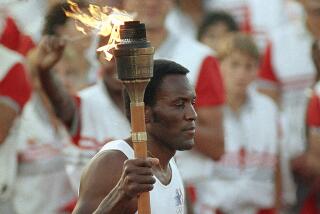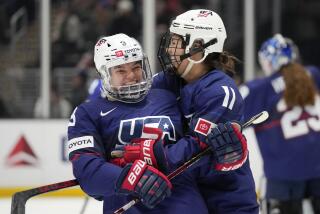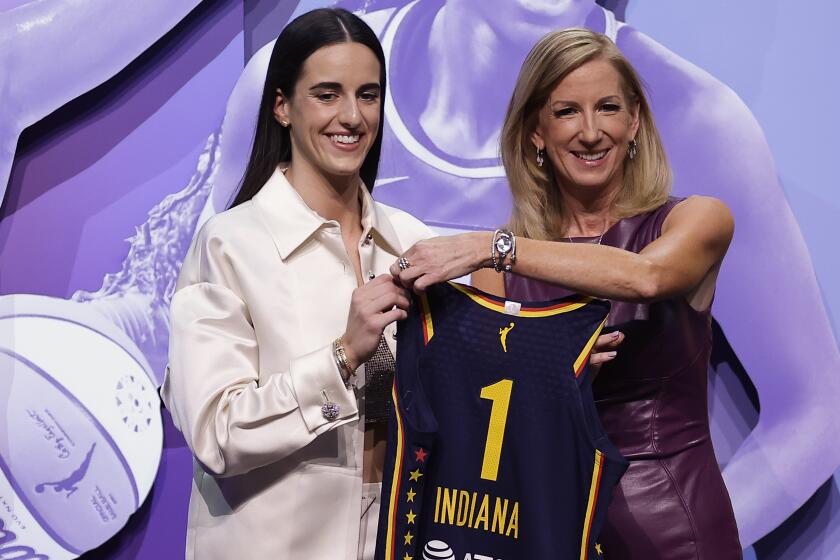From ‘Miracle on Ice Stop’ to ‘#Sochi’
SOCHI, Russia -- My Winter Olympic experiences have gone from telegrams to Twitter, from a small, isolated village in New York’s Adirondack Mountains that produced a sports miracle few people knew about as it unfolded to an international resort on Russia’s Black Sea where the world can keep up with every development almost immediately by consulting mobile devices that didn’t exist even a few years ago.
The Sochi Games will be my 10th straight Winter Olympics and 14th Games, including Summer Olympics. My first was Lake Placid, and we drove up from Long Island, where I worked for Newsday. My boss, the late Dick Sandler, told me I’d cover figure skating and some hockey. When the underdog American hockey team was eliminated, he said, we would ignore it.
Dick was a wonderful sports editor, but he was slightly off on that prediction.
Chatting last week with Bob Suter, a defenseman on the 1980 U.S. “Miracle on Ice” hockey team, reminded me of how much the Winter Olympics have grown and the massive changes that have taken place over a relatively short period.
Few people remember, but the U.S.-Soviet Union hockey game was televised on delay, not live. And because Lake Placid was so remote in the era before the Internet and 24-hour news cycles, those of us there couldn’t know how hungrily the public was rallying around the hockey team’s success during a time of the Cold War, economic uncertainty and the Iran hostage crisis.
The only way we knew that the young team and self-styled authoritarian coach Herb Brooks had won the public’s hearts was by seeing the telegrams people had sent, messages that were displayed in the arena near and inside the U.S. team’s locker room. The telegrams expressed thanks and patriotism and hope, a flood of emotions from people who might not have been sports fans or hockey fans but drew hope from the team’s seemingly impossible deeds.
Thirty-four years later, Suter remembers those telegrams clearly.
“That’s what we had on our walls,” Suter said, “and that’s the only way we knew what was going on outside of Lake Placid — the telegrams that were put up in our locker room, because Coach Brooks kind of took all the heat and wasn’t letting us be around the press. He went to all the press conferences and we were pretty much sheltered until it was over.”
Among the changes that have occurred since 1980 is the opening of the hockey tournament to NHL players. If that makes impossible a repeat of the David-and-Goliath story line that played out in 1980 between the mighty Soviets and the American college kids, it also made it possible to see the best against the best. Suter, whose brother, Gary, played in two Olympics for the U.S., has come around to liking the idea of professionals playing for their homelands.
“The caliber of hockey is so much better now than it was back then, because the athletes are so well-trained and it makes for such good hockey and good entertainment,” he said. “And that’s what the Olympics are supposed to be, the best athletes representing their countries.
“I didn’t know how pro athletes would treat playing for their country, but they’re as fired up and enthused about playing for their country as I think we were.”
He knows that because his son, Ryan, grew up to be a fine NHL defenseman and an alternate captain of the U.S. team that will begin play here next week. Bob, who runs a rink in Madison, Wis., went to see Ryan at the 2010 Vancouver Games and soon realized the cozy, quaint Olympics he knew had become a behemoth.
“It’s so big, and there’s so much press and so many sponsors and stuff that are added and part of it,” Suter said. “And the TV coverage is unbelievable. The personalities you see too. Not only sports, but actors. Everything about it is so big and global.”
Too big, really, when venues are so far apart that it’s difficult to see more than one event each day. Too big when it’s possible, if you follow hockey, figure skating or curling, to go through a Winter Olympics without seeing snow. I never saw snow in Vancouver and probably won’t see any here in what’s known as the coastal cluster, where temperatures are expected to be in the 40s.
The world and the Olympics have become complicated since Lake Placid. Lillehammer, Norway, site of the 1994 Games, lives on in my memory as the most beautiful and warm-hearted. I remember candles placed in the front windows of all the houses we passed on the way from the Oslo airport, brave soldiers defying the dark Nordic night. Those candles would be welcome now in Sochi in place of the light bulbs missing from my dorm room.
Sochi will have its stories, and we will capture them by tweet and Instagram and the world will know in an instant. The way we communicate changes, but a well-told story remains a powerful force. I’m glad to have seen those telegrams and to be around to see what comes next.
Twitter: @helenenothelen
More to Read
Get our high school sports newsletter
Prep Rally is devoted to the SoCal high school sports experience, bringing you scores, stories and a behind-the-scenes look at what makes prep sports so popular.
You may occasionally receive promotional content from the Los Angeles Times.






